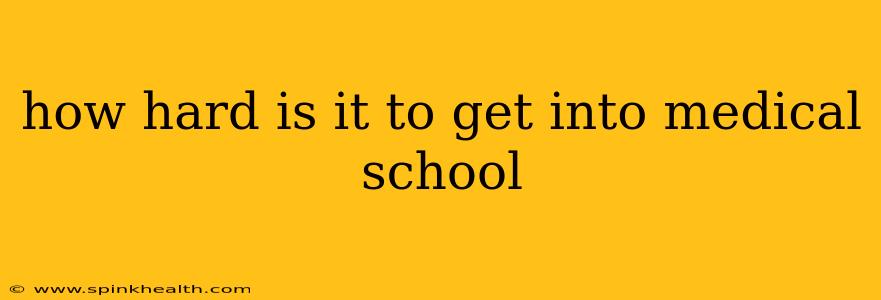How Hard Is It to Get Into Medical School? A Journey Through the Application Process
The question, "How hard is it to get into medical school?" is a loaded one, echoing in the minds of countless aspiring physicians. It's not a simple yes or no answer, but rather a complex tapestry woven with threads of academic excellence, unwavering dedication, and a touch of sheer luck. Think of it as climbing a challenging mountain; the difficulty depends on the path you choose, your preparation, and the weather conditions you encounter along the way.
My own journey into medical school felt like scaling Everest in a blizzard—challenging, exhilarating, and occasionally terrifying. I remember the late nights spent poring over textbooks, the nail-biting anticipation of MCAT scores, and the sheer exhaustion of countless applications. But amidst the struggle, there was an undeniable satisfaction, a sense of purpose driving me forward.
Let's delve deeper into the aspects that make this journey so demanding:
What are the main challenges in getting into medical school?
This is perhaps the most common question, and rightfully so. The challenges are multifaceted and require a holistic approach to overcome.
-
Academic Rigor: The foundational requirement is a strong academic record, typically a bachelor's degree with a high GPA, preferably in a science-related field. Classes are incredibly demanding, often requiring meticulous study and time management skills.
-
The MCAT: The Medical College Admission Test (MCAT) is a grueling exam assessing critical analysis and problem-solving skills, alongside scientific knowledge. Preparing for the MCAT often involves months of dedicated study and practice.
-
Extracurricular Activities and Volunteer Work: Medical schools seek well-rounded individuals, not just academic superstars. Demonstrating a commitment to community service, research, or leadership roles is crucial in showcasing your personal qualities.
-
Letters of Recommendation: Strong letters of recommendation from professors, mentors, or physicians who can attest to your character, work ethic, and potential are invaluable.
-
The Application Process Itself: The application process is intensely competitive and time-consuming, requiring careful planning, meticulous attention to detail, and significant effort. Multiple applications to different schools add to the pressure.
-
The Interview: Once you've cleared the application hurdle, the interview is the final hurdle. This is where your personality, communication skills, and passion for medicine will be assessed.
What is the acceptance rate for medical school?
The acceptance rate for medical school varies significantly depending on the institution. Highly competitive schools may have acceptance rates as low as 2-3%, while others may be slightly higher. The overall average acceptance rate in the US is around 4%, underscoring the intense competition. The lower the acceptance rate, the harder it is to get in, naturally.
How can I increase my chances of getting into medical school?
This is where proactive planning and dedicated effort come into play.
-
High GPA and MCAT Score: This forms the bedrock of your application. Aim for the highest possible scores achievable through consistent hard work and strategic study.
-
Meaningful Experiences: Don't just accumulate extracurricular activities; participate in activities that genuinely interest you and allow you to contribute meaningfully to your community.
-
Strong Letters of Recommendation: Cultivate strong relationships with your professors and mentors, seeking their guidance and feedback.
-
Compelling Personal Statement: Craft a personal statement that highlights your unique experiences and motivations for pursuing a career in medicine. It's your chance to show your personality and aspirations.
What are some common mistakes applicants make?
Many applicants fall short due to avoidable mistakes:
-
Underestimating the MCAT: Failing to dedicate sufficient time to MCAT preparation is a common pitfall.
-
Lack of Focus in Extracurricular Activities: Simply listing numerous activities without genuine commitment is counterproductive.
-
Weak Personal Statement: A poorly written or uninspired personal statement can sink your application.
-
Ignoring Application Deadlines: Missing deadlines is a major setback.
The journey to medical school is arduous, demanding dedication, perseverance, and strategic planning. However, with the right preparation and mindset, it's a path that can be successfully navigated. Remember, it's not just about the destination, but also the journey itself, the growth and self-discovery along the way. And perhaps the most important advice: Stay true to yourself, and your passion for medicine will shine through.

